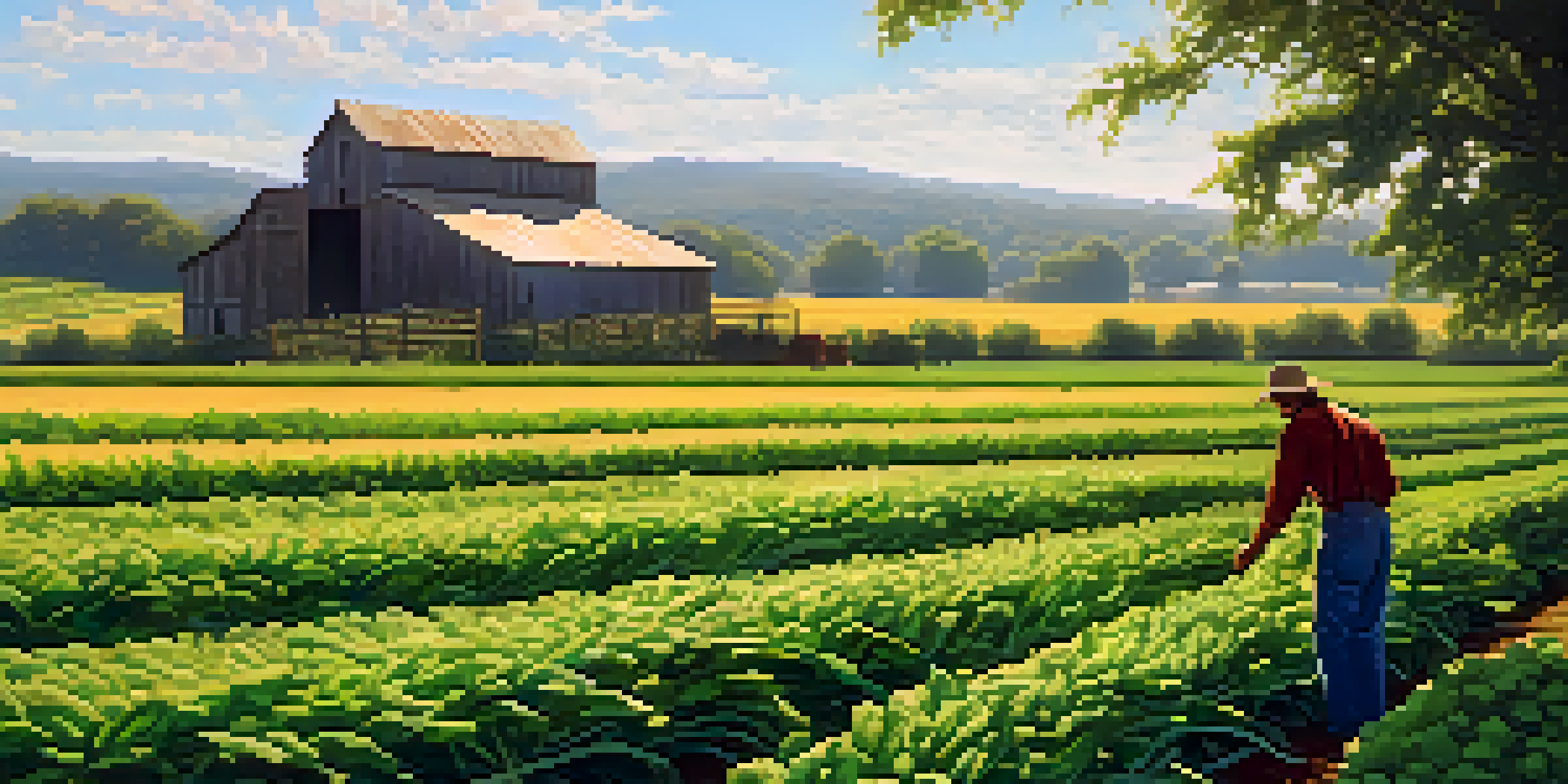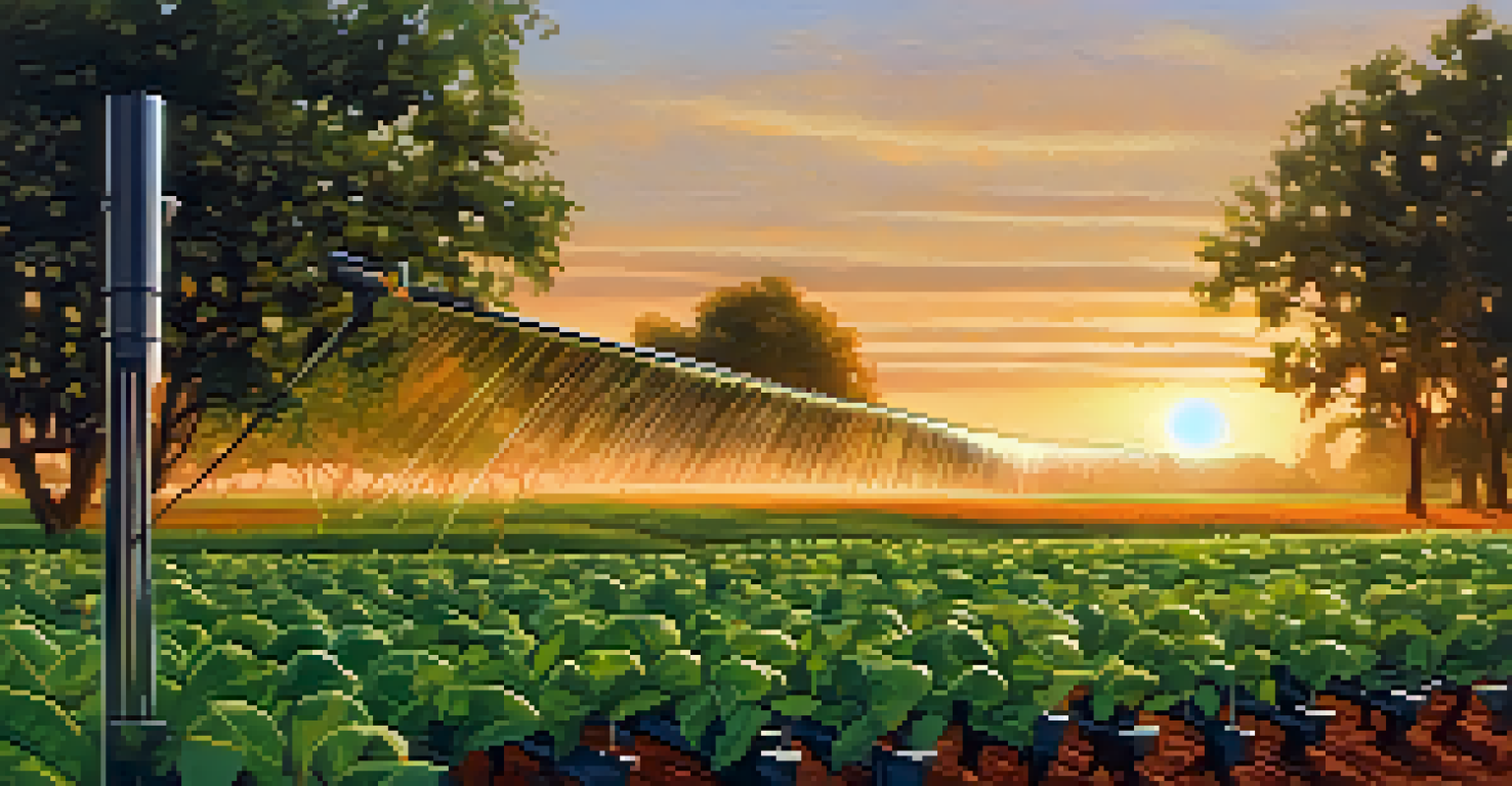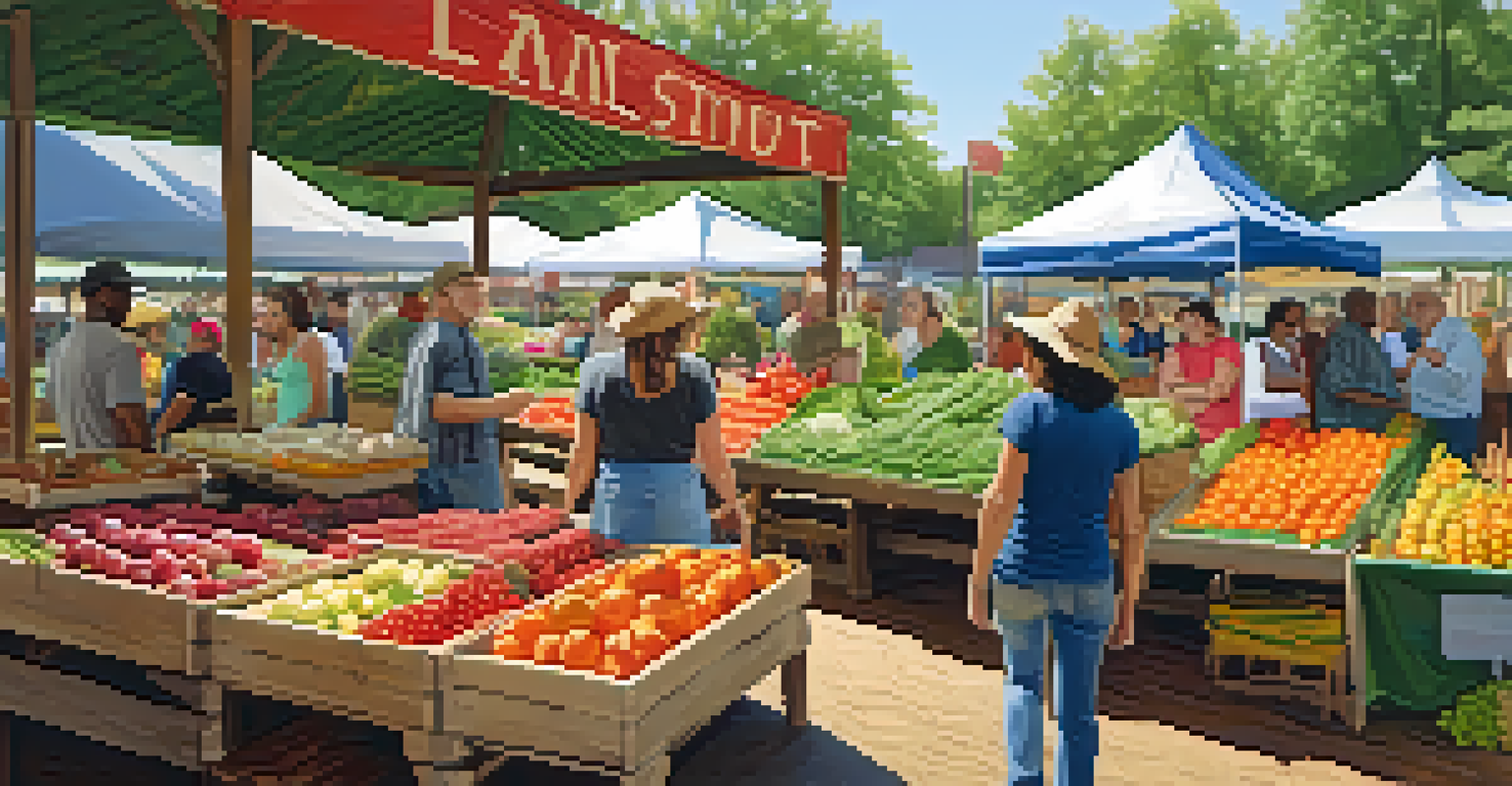Sustainability in Georgia's Agriculture: Current Trends

The Rise of Organic Farming in Georgia
Organic farming has surged in popularity across Georgia, reflecting a growing consumer demand for healthier food options. Farmers are now prioritizing organic practices, such as crop rotation and natural pest control, to enhance soil health and reduce chemical usage. This shift not only benefits the environment but also helps farmers tap into premium markets, boosting their profits.
Sustainable agriculture is a system of cultivation that improves the quality of the environment and the quality of life for farmers and society as a whole.
For instance, farms like White Oak Pastures have become pioneers in this movement, demonstrating that organic practices can lead to sustainable livestock production. By focusing on humane animal treatment and regenerative land practices, they showcase how profitability and sustainability can go hand in hand. Such success stories are inspiring other farmers to make the transition to organic.
Moreover, the Georgia Department of Agriculture supports this trend by providing resources and certifications for aspiring organic farmers. This encouragement fosters a community of environmentally conscious growers, further contributing to the state's agricultural landscape.
Innovations in Water Management
Water scarcity is a pressing issue for Georgia's agriculture, but innovative water management techniques are making a difference. Farmers are increasingly adopting methods like drip irrigation and rainwater harvesting to optimize water usage, especially during drought conditions. These technologies not only conserve water but also enhance crop yields, proving that sustainability can be both smart and economical.

For example, the use of precision agriculture tools allows farmers to monitor soil moisture levels in real-time, ensuring that crops receive the exact amount of water they need. This targeted approach minimizes waste and maximizes efficiency, which is essential in a state known for its agricultural output. Such practices are paving the way for a more resilient farming environment.
Organic Farming Gains Popularity
Georgia's farmers are increasingly adopting organic practices to meet consumer demand and enhance sustainability.
Additionally, collaborations between universities and agricultural organizations are promoting research into sustainable water practices. These partnerships aim to develop new techniques tailored to Georgia's unique climate and agricultural demands, ensuring that water management remains at the forefront of sustainable farming.
Embracing Agroforestry Practices
Agroforestry is gaining traction in Georgia as a way to combine agriculture and forestry for mutual benefit. By integrating trees into farming systems, farmers can enhance biodiversity, improve soil quality, and provide shade for crops and livestock. This practice also helps mitigate climate change by increasing carbon sequestration on farms.
The greatest threat to our planet is the belief that someone else will save it.
One inspiring example is the use of pecan trees alongside traditional row crops, which not only provide additional income but also create a more balanced ecosystem. The shade from the trees can reduce heat stress on crops, leading to healthier plants and better yields. This symbiotic relationship highlights the potential for innovation in sustainable agriculture.
As more farmers learn about the benefits of agroforestry, educational programs are emerging to guide them in implementing these practices. These initiatives foster a sense of community among farmers, encouraging the sharing of experiences and techniques that promote ecological stewardship.
The Role of Sustainable Certification Programs
Certification programs play a critical role in promoting sustainable practices among Georgia's farmers. Programs such as the USDA Organic Certification and the Certified Naturally Grown label provide farmers with the recognition needed to attract environmentally conscious consumers. These certifications not only validate sustainable efforts but also open doors to new market opportunities.
Farmers who achieve these certifications often report increased sales and customer loyalty, as consumers are more likely to support businesses that prioritize environmental responsibility. Additionally, these programs encourage farmers to adopt best practices in resource management and crop production, further enhancing sustainability across the sector.
Innovative Water Management Techniques
Farmers in Georgia are using advanced water management strategies like drip irrigation to conserve water and improve crop yields.
Furthermore, local organizations are emerging to support farmers in obtaining certifications, offering workshops and guidance. By facilitating access to these programs, Georgia is fostering a culture of sustainability that can drive the entire agricultural community forward.
Community Supported Agriculture (CSA) Growth
Community Supported Agriculture (CSA) has become a popular model in Georgia, connecting consumers directly with local farmers. This system allows consumers to subscribe to receive fresh produce regularly, providing farmers with upfront capital to plan their crops. It fosters a sense of community and encourages people to support local agriculture.
Through CSAs, consumers develop a deeper understanding of where their food comes from and the importance of sustainable practices. This model promotes seasonal eating and reduces the carbon footprint associated with transporting food long distances. As a result, both farmers and consumers benefit from a closer relationship.
Many CSAs in Georgia are also incorporating educational components, hosting farm tours and workshops to teach members about sustainable farming techniques. This engagement not only empowers consumers but also builds a supportive network for farmers, highlighting the positive impact of community-focused agricultural initiatives.
Sustainable Pest Management Approaches
Sustainable pest management is evolving in Georgia, with farmers increasingly adopting integrated pest management (IPM) strategies. This approach combines biological, cultural, and mechanical practices to control pests while minimizing environmental impact. By reducing reliance on chemical pesticides, farmers are creating healthier ecosystems and safeguarding their produce.
For instance, many farmers are turning to beneficial insects, like ladybugs and lacewings, to naturally control pest populations. This method not only decreases the need for chemical interventions but also enhances biodiversity on farms. Such practices illustrate how sustainability can be woven into the fabric of agricultural productivity.
Community Supported Agriculture Thrives
CSAs in Georgia create a direct connection between consumers and local farmers, promoting sustainable practices and community engagement.
Moreover, educational programs are equipping farmers with the knowledge needed to implement IPM effectively. These initiatives emphasize the importance of monitoring pest populations and understanding their life cycles, empowering farmers to make informed decisions for sustainable pest control.
The Impact of Climate Change on Agriculture
Climate change poses significant challenges for Georgia's agricultural sector, impacting everything from crop yields to pest dynamics. As temperatures rise and weather patterns shift, farmers must adapt their practices to ensure sustainability. This can include selecting more resilient crop varieties and adjusting planting schedules to align with changing conditions.
For example, some farmers are experimenting with drought-resistant crops that require less water, thereby conserving this precious resource. Others are implementing cover cropping techniques to improve soil health and reduce erosion, which can be exacerbated by extreme weather events. These adaptive strategies highlight the resilience of Georgia's agricultural community.

Additionally, collaboration among farmers, researchers, and policymakers is vital to develop effective responses to climate challenges. By sharing insights and resources, the agricultural sector can build a more sustainable future that is better equipped to handle the impacts of climate change.
Future Prospects for Sustainable Agriculture in Georgia
Looking ahead, the prospects for sustainable agriculture in Georgia appear promising. With ongoing innovation and a growing consumer base that values sustainability, farmers are poised to embrace new practices that benefit both their businesses and the environment. This shift is not just a trend; it's becoming a fundamental aspect of agricultural identity in the state.
Moreover, as technology continues to advance, farmers have access to an array of tools that enhance sustainability efforts. From precision agriculture to data analytics, these innovations empower farmers to make informed decisions that optimize resource use and minimize waste. The future of agriculture in Georgia is likely to be defined by these advancements.
Ultimately, the collective efforts of farmers, consumers, and policymakers will shape the trajectory of sustainable agriculture in Georgia. By fostering a culture of sustainability, the state can lead the way in creating an agricultural system that is resilient, responsible, and ready for the challenges of tomorrow.